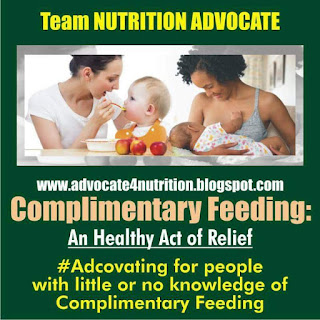COMPLEMENTARY FEEDING: AN HEALTHY ACT OF RELIEVE
It has been proven by experts and various organizations (WHO, UNICEF etc) that exclusive breast feeding for the first six month is not only necessary but essential for proper development of the newborn as it provide all necessary nutrient. Breastmilk only however could not meet the need of the baby after six month though it should continue till 2 years of life, hence the need for complementary foods(family food).
As infants grow, their nutrient needs grow with then. To keep up with these growing demands, WHO recommends that infants begin eating solid, semi-solid or soft foods at 6 months of age to ensure that their nutrient intake is sufficient to fuel their developing brains and bodies. The foods consumed between 6 months and 2 years of life are called complementary foods because they ideally complement an already breastmilk-based diet, and the 18-month period between 6 months and age 2 is referred to as the complementary feeding period.
During the complementary feeding period, it is recommended that children eat a frequent and diverse diet of nutrient-rich and hygienically prepared complementary foods in addition to breastmilk. Evidence has shown that a diet comprising at least four food groups a day is associated with improved growth in young children. Introducing children to healthy and diverse foods at an early age also helps to establish taste preferences and good eating habits later in life.
Complementary feeding also act as a stress reliever because the frequency of breast feeding reduce by the commencement of complementary feeding.
Belows are critical point to hold on during complementary feeding period.
1) The complementary food should be nutritionally rich.
2) The food should be well prepared and under a clean environment.
3) It should be in a convenient form for the baby.
4) Locally available food should be used as this build up the taste of the baby.
5) Mothers should not schedule the feeding frequency but feed as required by the baby.
6) Food shouldn't be feed in a forceful way.
7) Feed baby with varieties of food.
8) Supplement food to be given with other foods.
9) Run away from convinient food as much as possible.
10) Note the reaction of your child on feeding of particular foods in order to look out for allergies.


.jpeg)
Comments
Post a Comment